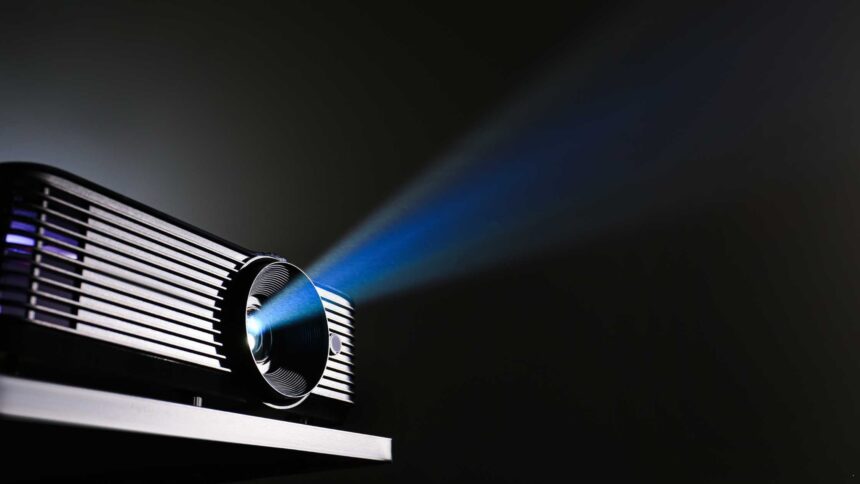Types of Projector
Before diving into the different types of projector, let’s first understand what a projector is and how it works.
What is a Projector?
A projector is a device that takes images from a computer or Blu-ray player and displays them on a screen or wall. Like a magic lantern, it brings digital content to life. But what exactly is a projector, what are the different types of Projector, and how does it work its magic?
This guide looks closely at projectors. It explains how they work and the different types available. It also helps you how to choose the right one for you.
How Does It Work?
A projector is a device that shows pictures or videos. It projects images and videos onto a larger surface, like a screen or a wall. The magic happens through a combination of light and lenses:
- Light Source: Projectors use either a bright lamp (traditional) or a light-emitting diode (LED) as the light source.
- Image Processing: The projector receives the image signal from a computer, media player, or other source.
- Projection System: The light source illuminates the image, passing through a series of mirrors and lenses. These elements magnify and focus the image to create a sharp and clear projection.
- Projection Surface: The focused light hits the screen or wall, showing a larger image for everyone to see.
Types of Projectors

The projector world offers a variety of options to suit different needs and budgets. Here below you can see the most common types:
- 4K Projectors
- LED Projectors
- LCD Projectors
- Liquid Crystal on Silicon Projectors(LCoS)
- Nebula Projectors
- Laser Projectors
- DLP Projectors
- Light Projectors
- Mini Ray Projectors
- Pocket Projectors
- Optoma Projectors
- Projector TVs
- Video Projectors
- Movie Projector
- Short Throw Projectors
- Ultra Short Throw Projectors
- Classroom Projector
- Film Projectors
- Laser Light Projectors
- Mini Projectors and so on.
Types of Projectors & Its Features
1. 4K Projectors:
- Ultra-High Resolution: A 4K projector boasts an impressive resolution of 3840 x 2160 pixels, providing incredibly detailed images.
- Home Theater and Gaming: Perfect for creating a cinematic experience at home and enhancing gaming visuals.
- Stunning Clarity: Whether you’re watching movies or playing games, the sharpness and fine details are unmatched.
2. LED Projectors:
- Energy Efficiency: LED projectors use light-emitting diodes, which consume less power and have a longer lifespan.
- Portable: easy to carry, projectors are useful for business, education, and home use.
- Instant On/Off: No waiting time – they’re ready to use instantly.
3. LCD Projectors:
- Sharp Images: LCD projectors rely on liquid-crystal display technology to deliver accurate colours and detailed visuals.
- Business and Education: Best for boardrooms, classrooms, and conference halls.
- Cost-Effective: Generally affordable prices compared to other types.
4. Liquid Crystal on Silicon Projectors(LCoS):
- Hybrid Technology: LCoS projectors blend the best features of LCD and DLP technologies. They use liquid crystal chips with mirrored backings to create high-quality images.
- High-resolution and high-contrast projectors are perfect for producing detailed and vivid images, making them excellent choices for home theatre setups and professional presentations.
- Smooth Image Quality: LCoS projectors provide flicker-free, smooth images, which makes them perfect for fast-paced content such as sports or action films.
5. Nebula Projectors:
- Portable Convenience: Nebula projectors, associated with the Nebula brand, are compact and versatile.
- On-the-Go Fun: If you are camping, travelling, or having a movie night in your yard, Nebula projectors are great to have.
6. Laser Projectors:
- Bright and Accurate: Laser projectors use laser light sources, resulting in high brightness and precise colour reproduction.
- Long-Lasting Performance: Their extended lifespan requires minimal maintenance.
- Home Theaters and Beyond: From home theatres to large venues, laser projectors deliver impressive visuals.
7. DLP Projectors:
- High Contrast Ratio: High Contrast Ratio: DLP (Digital Light Processing) projectors offer vivid colours and bright images.
- 3D Movie Magic: Ideal for watching 3D films with depth and realism.
- Entertainment Delight: Whether it’s movie night or gaming, DLP projectors won’t disappoint.
8. Light Projectors:
- Flexibility: The term “light projector” encompasses various types, including LED, laser, or traditional lamp-based projectors.
9. Mini Ray Projectors:
- Portability: The Mini Ray is extremely light (just 27 grams) and small, so you can easily carry it in your pocket or bag. It’s perfect for impromptu presentations or movie nights.
- Simple Setup: No complicated installation is required! Just connect it to your smartphone via an OTG cable, download the DisplayLink Presenter App, and start projecting.
- Maintenance-Free: Unlike traditional projectors, it doesn’t rely on bulbs or lamps. Instead, it uses your smartphone’s battery, saving you maintenance costs.
- Budget-Friendly: The Mini Ray offers convenience without breaking the bank.
10. Pocket Projectors:
- Ultra-Portable: Fits in your pocket, making it convenient for impromptu presentations, travel, or movie nights on the go.
11. Optoma Projectors:
- Reputable Brand: Optoma offers a diverse range of projector models, catering to different needs.
- Reliable Performance: Known for quality and customer satisfaction.
12. Projector TVs:
- Refers to projectors used as a TV replacement.
- Combines large-screen viewing with projector technology.
- Advantages of projector TVs include flexibility in screen size and space-saving design.
13. Video Projectors:
- A versatile device for displaying videos, presentations, and other visual content.
- Video projectors can be DLP, LCD, and LED.
- Applications: home theatres, classrooms, and business presentations.
14. Movie Projectors:
- Typically used for screening films in theatres or home cinemas.
- Nostalgic appeal: preserving cinematic traditions.
- Difference between digital projectors and traditional 35mm film projectors.
15. Short Throw Projectors:
- Designed to project bigger images from a short distance.
- Ideal for small rooms or limited space.
- Benefits: reduced shadows and clutter.
16. Ultra Short Throw Projectors:
- Compact Design: UST projectors can project large images from just a few inches away from the screen or wall. This makes them perfect for small spaces where traditional projectors might not be practical.
- Simple Setup: UST projectors can easily sit on a TV stand or furniture near the screen, unlike regular projectors that need ceiling mounts or long cables. This makes installation straightforward and reduces clutter.
- High-Quality Viewing: UST projectors are bright and have great image quality, so they work well in well-lit rooms. Placing the projector close to the screen provides a cinematic experience with minimal shadow interference.
17. Classroom Projectors:
- Used in educational settings for presentations and interactive learning.
- Features: wireless connectivity, interactive whiteboard compatibility, portability.
- Enhancing teaching experiences with classroom projectors.
18. Film Projectors:
- Specifically designed for projecting 35mm film reels.
- Rarely used today due to digital formats.
- Historical significance in cinema.
19. Laser Light Projectors:
- Projects laser patterns or decorative lights.
- People commonly used them for parties or outdoor events.
- Creative applications: holiday decorations, immersive light displays.
20. Mini Projectors:
- Compact projectors are suitable for travel or casual use.
- Considerations: portability, battery life, connectivity options.
- Scenarios: impromptu movie nights, business trips.
Advantages and Disadvantages of Projectors
Projectors offer several advantages over traditional displays:
- Large Screen: Projectors can create a much larger viewing experience than a TV or monitor.
- Portability: Many projectors are compact and lightweight, making them easy to transport for presentations or outdoor movie nights.
- Flexibility: People use projectors for various purposes, including presentations, movies, gaming, and artistic installations.
some drawbacks to consider:
- Ambient Light: Projectors require a dimly lit environment for optimal image quality.
- Setup: Setting up a projector can involve connecting cables and positioning it correctly for the desired image size.
- Cost: Projectors can range in price from budget-friendly to high-end models, with higher-quality options carrying a steeper price tag.
List of Popular brands of projectors with cost

Epson
Cost Range: $500 – $3000+
Reviews:
Epson projectors are popular for their excellent image quality, brightness, and reliability. They are a top choice for both home theatre fans and business presentations.
The Epson Pro Cinema LS12000 is a 4K laser home theatre projector from Epson. It’s ideal for real-time tasks because of its high resolution and minimal input lag.
Sony
Cost Range: $1000 – $8000+
Reviews:
People recognize Sony projectors for their exceptional picture quality, especially in home theatre settings. They often incorporate advanced technologies like 4K resolution and HDR, though they tend to be higher priced.
BenQ
Cost Range: $500 – $3000+
Reviews:
People appreciate BenQ projectors for their balanced performance. They provide excellent project image quality at competitive prices, making them popular for both home entertainment and business use.
Optima
Cost Range: $400 – $5000+
Reviews:
People know Optoma projectors for their wide range of models, which cater to different needs. These range from budget-friendly options to high-end models with advanced features like 4K resolution and high brightness levels.
ViewSonic
Cost Range: $300 – $2000+
Reviews:
ViewSonic projectors are praised for their flexibility and solid performance across various use cases, including home entertainment, classrooms, and small conference rooms.
LG
Cost Range: $500 – $3000+
Reviews:
LG projectors often integrate smart features and are known for their compact designs. They are popular for both home theatre setups and portable use.
Acer
Cost Range: $300 – $2000+
Reviews:
Acer projectors offer a good balance of price and performance, making them suitable for budget-conscious consumers looking for reliable projectors for home or office use.
Casio
Cost Range: $500 – $3000+
Reviews:
Casio projectors are recognized for their hybrid LED-laser light source, which provides long-lasting brightness and eliminates the need for lamp replacement, making them popular in educational and business environments.
NEC
Cost Range: $500 – $5000+
Reviews:
NEC projectors are known for their durability and reliability, with models suitable for various applications ranging from classrooms to large venue installations.
Xgimi
Cost Range: $300 – $2000+
Reviews:
Xgimi projectors are gaining popularity for their portable and feature-rich designs, often including built-in speakers and Android OS, making them versatile for home entertainment.
Precautions While Using Projectors

Projectors are generally safe to use, but here are some precautions to keep in mind:
- Placement: Ensure proper ventilation around the projector to prevent overheating.
- Lens Care: Clean the projector lens with a soft cloth to maintain optimal image quality.
- Power Source: Use a surge protector to protect your projector from voltage fluctuations.
- Safety: Keep the projector out of reach of children and pets to avoid accidental damage.
Conclusion
Projectors are a versatile and impactful tool for a variety of purposes. They offer the ability to create a massive viewing experience, perfect for presentations, movie nights, or even artistic displays. Their portability makes them ideal for use on the go, while their wide range of types ensures a projector to suit almost any need and budget.
However, it’s important to consider the limitations of projectors, such as their dependence on a dark environment and the setup involved. By weighing the pros and cons, and following safety precautions, you can determine if a projector is the right choice for you. If it is, this guide has equipped you with the knowledge to navigate the different projector types and brands to find the perfect fit for your next big presentation or immersive home theatre experience.
How to choose the best water purifier?





good projectors ever
Good ideas ever.
I really don’t have any knowledge about various types of projectors.Lots of thanks to you for theis article as I have gained vast information about projectors!